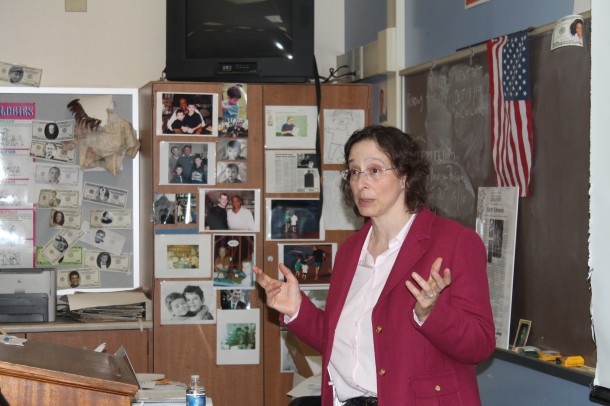
Stanford Law School professor Pamela Karlan addressed current civil rights issues, including voting fraud, marriage rights and affirmative action in front of Palo Alto High School students today during Tutorial.
Karlan is a civil rights authority and an expert on gay, criminal and courting rights. History teacher David Rapaport invited Karlan to speak to students today in room 308.
In light of the ensuing presidential election, Karlan began her discussion by addressing two different views: expand or contract voting rights, and the effects of voting fraud.
“There is no place in the Constitution that says people have the right to vote,” Karlan said. “It [the Constitution] only says where the government can’t deny people the right to vote. A lot of our right comes from statutes passed by Congress or state legislature.”
Karlan brings up two world views when it comes to the issue of voting fraud. One view supports the idea that people who have the right to vote should not deserve that privilege. The second view claims that the greatest threat is the exclusion of people from their rights to vote; she argues that it is better that some underprivileged people are allowed to vote than denying people that right altogether.
She also described that voting fraud, although prevalent, possesses very little benefit while imposing high risks for those who are caught. Even if a fraudulent votes go through, “you are more likely to be killed on the way to the voting polls than having your vote be a decisive one,” Karlan said.
When the discussion transitioned into gay marriage rights, Karlan, who is gay, explained that the fundamental cause for conflict is how one defines marriage.
“The Constitution never uses the word marriage,” Karlan said. “Yet the fifth and fourteenth amendments state, including the due process clause, that government can’t deny any person the due process of law. So some people have interpreted similarly, there are some liberties so fundamental that government can’t take them away. Some believe that that marriage is one of those liberties.”
According to Karlan, the traditional definition states that marriage is between one man and one woman. To supporters of gay marriage, marriage is a partnership between two consenting adults who want to share a life together.
“Treating people equally is treating people that are alike similarly and treating people who are different differently,” Karlan said. “This brings up the question of are gay people fundamentally similar or different from the traditional married couple?”
According to Karlan, pro-gay marriage advocates support the idea that all people should be treated equally with respect to marriage, while anti-gay marriage supporters defend the idea that gays are fundamentally different from heterosexuals and should not be given that right.
“If anyone who has been to a wedding has noticed,” Karlan said, “the pastor always says by the power vested in me by the state of blank, California for example. Marriage has been a state defined law, and because of this I do expect to see in the Supreme Court, in the next three to four years, a case arguing that the state can’t restrict marriage from couples of the same sex. ”
As Mr. Rapaport asked the hypothetical questions: What kind of college do you want? Should they consider race in their decision? Karlan shifted her discussion toward race.
In regards to California, Karlen tells us that California Proposition 209 states that no governmental institution can take race into account in deciding who gets a particular obligations or benefits. However, private institutions such as Stanford University are allowed to do so.
Fisher v. University of Texas, a case that will be judged by the Supreme Court this Wednesday, Oct. 10, represents a modern day example of affirmative action .
The case involves two Caucasian females, who have sued the public institution for using race unfairly against the them.
“If you are in the top 10 percent [GPA] in your class in Texas, you get into the University of Texas,” Karlan said. “The problem with this is that great students could not be in this top percentile. Some students could be great poets yet not great at sciences, or a math wise that can’t write.”
To help counteract this issue, Karlan said that 80 percent are chosen from the top 10 percentile and 20 percent are chosen from looking at the overview of students. In this latter percentile, they look at a student’s unique strengths, their talents, any slight disability, their level of English, home issues and race into consideration.
According to Karlan, the University of Texas lets in around 20,00 freshmen per year, and while this current 80-20 percent structure may work for their institute, it is not feasible at a school like Stanford University. Stanford lets in six percent of the applicants into a school of approximately 7,000 undergrads.
“They couldn’t let in the top 10 percent of every school where student apply,” Karlan said. “They couldn’t even let in just the valedictorians from all those schools.”
Karlan finished her talk with a brief question and answer session, during which she shared with students information regarding her professional career.
A few years ago, Karlan was considered a possible nominee to replace Justice David H. Souter on the Supreme Court, but President Obama appointed Judge Sonia Sotomayor instead.
Currently, Karlan is working on a case, Windsor v. United States, that involves an 83 year old woman, Edie Windsor, who was forced by the United States Government to pay over $353,053 in taxes. Windsor was forced to pay these federal estate taxes because the government would not recognize Windsor’s marriage due to the Defense of Marriage Act. The case is currently pending review from the Supreme Court.


Kate Kaufman • Oct 10, 2012 at 5:13 pm
another great job, Levi.